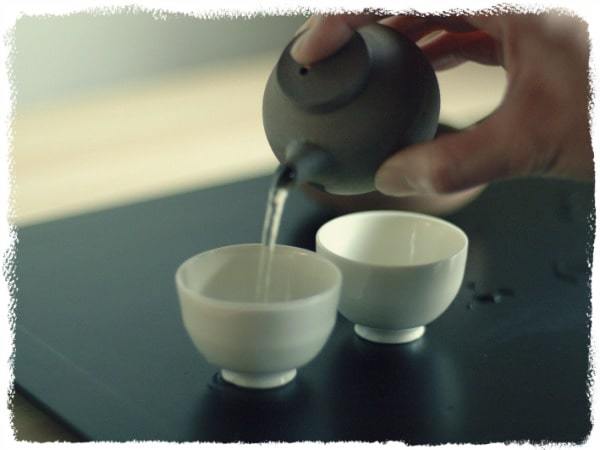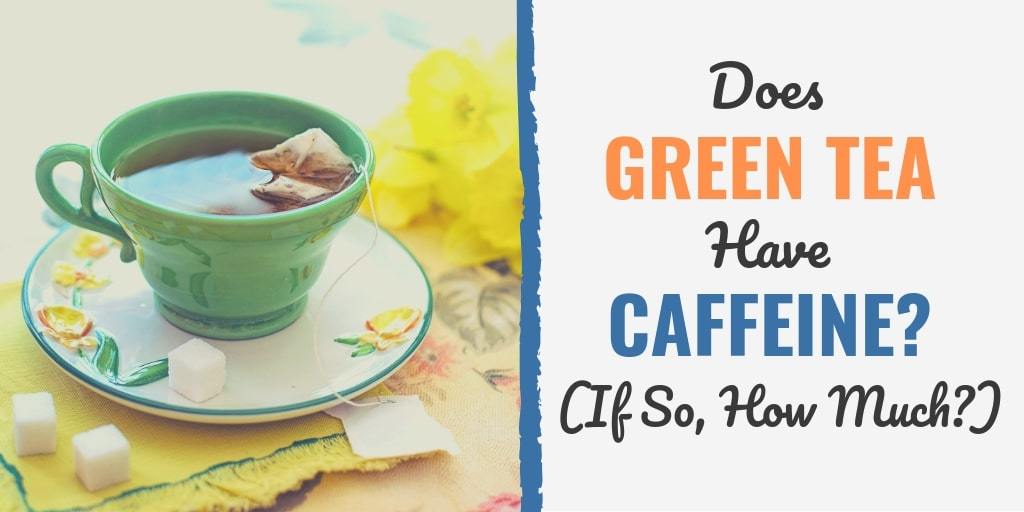There might be affiliate links on this page, which means we get a small commission of anything you buy. As an Amazon Associate we earn from qualifying purchases. Please do your own research before making any online purchase.
Green tea has become a popular beverage all over the world because of its reported health benefits.
Although green tea is made from the leaves and buds of Camelia sinensis (just like oolong and black tea), it differs from the two other varieties. Mainly, green tea has not undergone the same withering and oxidation process that yields the two other kinds of tea.
Green tea is made from leaves that have simply been steamed and dried soon after they are harvested. Other teas are dried and crushed to allow the naturally occurring enzymes to convert the catechins to more complex compounds, giving them a distinctive flavor and darker color.
Many people have given up their coffee fix for the more calming green tea. Some assume that because of its relaxing effect, green tea does not contain caffeine.
However, the natural sources of caffeine are chocolate, tea, and coffee. Artificial sources include sodas and energy drinks. So, yes, green tea does contain caffeine. But the real question is “how much caffeine does green tea actually contain?”
Humans have consumed caffeine for hundreds of years. We drink it to stay awake, increase our alertness, help us stay focused, and improve our athletic performance.
The safety and effects of caffeine consumption have been evaluated in a study published in “Frontiers in Psychiatry.” This study reports that 400 milligrams of caffeine per day is the threshold for safe adult human consumption. An eight-ounce cup of coffee contains an average of 100–200 mg of caffeine, while green tea contains less.
Side bar: One simple health habit you can build is to drink this superfood green drink, which gives you a boost of energy and supplies your body with the nutrients it needs to get through the day. (You can also read the review of it here.)
But how much less? In today’s article, we will discuss the caffeine content of green tea. We’ll also talk about green tea’s health benefits, and give our recommendation for the best green tea brands to try.
Top Picks for Best Green Teas for 2020
Don't have time to read the whole article? Here's a quick look at our favorite green teas:
 |
Best Organic Green TeaBest Organic Green TeaUncle Lee’s Organic Green Tea | CLICK HERE FOR PRICE |
 |
Best Matcha TeaBest Matcha TeaPure Matcha, Premium Japanese Ceremonial Green Tea | CLICK HERE FOR PRICE |
 |
Most Popular ChoiceMost Popular ChoiceMaeda-en Japanese Sencha Green Tea | CLICK HERE FOR PRICE |
Caffeine Content by Type of Green Tea
There are different varieties and strains of green tea that all have a different amount of caffeine in them. The defining difference between the various types of green tea depends on where it is grown, the amount of sunlight the plant receives, the method that is used to harvest the tea, and the way the leaves are processed.
Some varieties are even formed by their specific drying process, such as grinding and rolling the leaves. Here are several types of green tea and the amount of caffeine (in milligrams) they contain per serving.
Naturally decaffeinated green tea
98% of the caffeine in a tea must be removed before a company can label it as being decaffeinated, leaving it with two milligrams per eight-ounce cup. During the decaffeination process, the tea leaves are soaked in water so they can rid themselves of caffeine.
The tea leaves are then separated from the water so it can be mixed with ethyl acetate, which absorbs all of the caffeine that was released into it. The tea leaves are then put back into the water so they can soak up their lost nutrients.
Gyokuro
This tea is popular because of its sweet flavor. About three weeks before the tea is harvested, the leaves are hidden from the direct sunlight in which they are grown. Once they are no longer receiving sunlight, they go through less photosynthesis, which helps them maintain strongly flavored amino acids and caffeine.
This tea ends up with one of the highest amounts of caffeine compared to the rest of the group, with 35 mg per eight-ounce cup. Because this variety of tea is more labor-intensive to shade and cultivate, the selling price is typically on the higher end.

Genmaicha
This inexpensive tea is made by combining Bancha tea leaves with another Japanese diet staple—brown rice. Once considered to only be consumed by peasants, Genmaicha has recently become more popular among the Japanese elite.
This variety has a warm and nutty flavor because it is combined with popped, roasted brown rice. Because the rice acts as a filler in place of additional tea leaves, this type of green tea only has four milligrams of caffeine per eight-ounce cup.
Bancha
Bancha green tea comes from the second harvest of the tea leaves. The leaves for this variety are picked during one of three periods between June and October, with the quality of the tea leaves decreasing with each harvest. This variety has 10 milligrams of caffeine per eight-ounce cup of tea.
Hojicha
Rather than being steamed like most other green teas, this variety is roasted in a pot over charcoal, and is made from the stalks of the plant rather than the leaves.
This tea tastes similar to coffee, but it is sweeter and has much less caffeine than coffee. The tea is cooked at a high temperature, leaving it with only eight milligrams of caffeine per eight-ounce cup.
Matcha
To make matcha, the leaves are removed from sunlight three weeks before being harvested. They are steamed, removed from their stems, and air dried after the harvest.
The leaves are then ground up to create matcha. This variety contains 32 milligrams of caffeine per 3.5-ounce cup, which is almost as much as a serving of black coffee.
The Benefits of Green Tea
Drinking green tea can increase your longevity in several ways. Mainly, the antioxidants, anti-inflammatories, and immunomodulatory properties in green tea help prevent heart disease. Specifically, the catechins found in green tea have been shown to have protective effects on the heart.
Additionally, consuming the polyphenols in green tea can help your body fight certain cancers by impacting the metabolism of carcinogens and preventing healthy cells from mutating into cancerous cells. Scientists have also discovered in lab studies that the polyphenols found in green tea (a micronutrient that has antioxidant properties) can help fight free radicals, and have anti-cancer properties.
Drinking green tea also reduces stress and anxiety. The compounds found in green tea block glutamate receptors, which leads to a decrease in the stress response. Also, green tea is a known GABA-blocker.
The neurotransmitter GABA has been identified as the cause of anxiety. Finally, green tea contains L-theanine, which is an amino acid that helps reduce stress, relax your mind and body, and ease symptoms of depression.
Several studies have shown L-theanine's ability to increase the brain's production of serotonin and dopamine. L-theanine also has folate in it, which is effective in boosting people's moods. Another mental health benefit of green tea is its ability to help you maintain cognitive function. The caffeine in green tea helps with mental alertness and focus.
Moreover, a 2015 study presented at the international Alzheimer’s and Parkinson’s conference revealed that study participants who consume a cup of green tea on a daily basis have a lower rate of mental decline than those who don't drink any green tea.

The main components of green tea that can improve cognitive function and neuroprotection are the polyphenols (especially EGCG). EGCG can protect your memory and learning ability by decreasing oxidative damage to your DNA, which ultimately suppresses brain dysfunction.
Lastly, green tea helps you build healthy bones and teeth. People who drink tea are known to have more bone mass density and less tooth decay than those who don't.
Not only do people who drink green tea have a higher bone mineral density, they also lose their bone density at a slower rate than non-drinkers. Finally, the catechins in green tea help destroy bacteria that leads to tooth decay, and increase the acid resistance of the enamel on your teeth.
Our Green Tea Recommendations
The following are the green tea brands we recommend based on their flavor, aroma, and overall quality.
Uncle Lee’s Organic Green Tea
You’ll love the aroma of this tea while it’s brewing. It is grown using only natural fertilizers (rather than pesticides), and the farmers pay careful attention to the preservation of the ecosystem. This tea contains about 20 to 30 mg of caffeine per cup, which is relatively low when compared to other varieties of green tea.
This organic tea is not bitter at all. Rather, it has a delicious, light, complex taste and aroma that tea drinkers crave. Many people prefer to drink this tea without adding sweeteners or milk due to its natural richness. Because this tea is organic, it will not have adverse effects on your health due to unnatural growing conditions.
Pure Matcha, Premium Japanese Ceremonial Green Tea
This matcha has been manufactured with the highest standards of quality, making it an ideal choice for drinking. This product is a premium, ceremonial-grade matcha that is stone-ground to produce a high-quality matcha powder that can be used to drink or to add to your cooking or baking.
Because the tea leaves are consumed entirely when drinking matcha, drinkers are consuming almost 10 times the amount of antioxidants, vitamins, minerals, and fibers than what can be found in other varieties of green tea.
Pure Matcha is grown in the Nishio region of Japan, which is where Japan's highest-quality teas come from. Nishio's stable climate, clean environment, fresh river waters, and fertile soil allow for the growth of resiliently green matcha that is full of nutrients. The freshness of this tea is guaranteed, as each tin is sealed air-tight to lock in the freshness.
Maeda-en Japanese Sencha Green Tea
This authentic Sencha is manufactured in Japan. It is often enjoyed both warm as a soothing drink and cold as a refreshing thirst-quencher. This particular brand is well-rounded, rich, and smooth tasting.
Sencha is the most popular of all of the varieties of green tea. The word “Sencha” translates to “roasted tea”, which refers to the original processing method of the tea leaves. For this product, the leaves are first steamed to eliminate oxidation and preserve the rich, emerald green color.
They are then dried with hot air, rolled, and roasted. This tea is highly aromatic, and can either be enjoyed alone or with a wide range of foods. This is many people's everyday, go-to choice for their green tea.
Conclusion
Green tea is a beverage with numerous health benefits that make it a popular choice for a beverage around the world. In studies comparing the health benefits of different teas, green tea has consistently shown to perform better than other varieties.
Many people prefer the gentle, stimulating effect of green tea over coffee. And there are many brands of green tea available on the market. We strongly recommend getting the best product that clearly states where the leaves were grown so you are aware of the quality of your tea. Ideally, it should be made organically and prepared according to the highest standards of tea-making.





